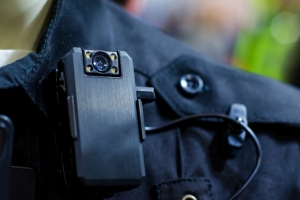Should NH law require police body cameras?

The New Hampshire Legislature is done voting on new bills in 2022, but some committees will meet in June to discuss whether certain bills should come back next year. One of these bills, HB 253, would require all police officers to wear body cameras.
History of body camera laws in NH
In 2020 the Commission on Law Enforcement Accountability, Community and Transparency (LEACT) recommended that New Hampshire “encourage all law enforcement agencies to use body and/or dash cameras.” This recommendation stopped short of a statewide mandate on cameras, and right now there is no law that requires law enforcement officers to use body cameras in New Hampshire.
Many police departments voluntarily use body and/or dashboard cameras, however, from the smaller Weare police force to the larger Manchester Police Department. The state police are still working to roll out body cameras after the Executive Council approved their proposal last summer.
In 2021 Gov. Sununu signed a bill to create a body-worn and dashboard camera fund. Local and county law enforcement agencies can apply for a grant to cover 50% of the cost to purchase cameras, maintain software, and store footage. This fund is intended to “encourage” cameras, as the LEACT Commission recommended.
A different bill, HB 253, looked to not only set up a fund to cover body camera costs, but to require all New Hampshire law enforcement agencies to equip officers with body cameras. Representatives voted to send this bill to “interim study,” which is usually a polite way to kill a bill in an election year. Representatives are following through on the bill, however; there is a committee meeting June 2 to discuss HB 253.
Arguments to require body cameras
Supporters of a statewide mandate for body cameras, like the one in HB 253, argue that cameras build trust between officers and community members by creating a neutral record of police interactions with the public. A police officer may be less likely to use excessive force if they know their actions will be available for the public to view. A member of the public may be less likely to antagonize an officer or file a frivolous lawsuit if they know their behavior is also being recorded.
Body cameras can also be a valuable source of evidence in criminal cases.
One of the first tests of body cameras in New Hampshire came in 2015, when body and dashboard cameras recorded police officers shooting Hagen Esty-Lennon in Bath, New Hampshire. Video showed Esty-Lennon pull out a knife and run towards the officers. Esty-Lennon was suffering from a mental health crisis, and his family filed a lawsuit to argue the shooting was reckless, but the video provided enough evidence for the Attorney General to rule that the shooting was justified.
The family of Esty-Lennon also sued to stop the body camera footage from being released to the public to protect their privacy. Local officials argued for release of the footage to assure the public that the shooting was necessary. A judge ruled in favor of releasing the footage, setting a precedent for public access to recordings going forward.
Since then police body camera footage has captured several other shootings, all ruled justified, and all available for public viewing. The “Multimedia” page on the state Department of Justice website includes videos of thirteen officer involved shootings.
Arguments against requiring body cameras
Opponents of a statewide mandate argue that it should be up to local police departments if body cameras are a good fit for their community. Body and dashboard cameras come with significant costs that include ongoing storage and maintenance. The state grant program only covers 50% of those costs.
There is also evidence that body cameras do not necessarily reduce police misconduct. For example, a review of studies by George Mason University’s Center for Evidenced-Based Crime Policy found that “the use of body cameras alone is unlikely to significantly improve police performance, accountability and relationships with citizens.”
Ultimately, cameras are only as good as the systems that support them. A recent lawsuit in Canaan provides an example. Crystal Wright says during a traffic stop then-police officer Samuel Provenza grabbed her hair, dragged her out of her car, and hit her in the knee, resulting in a torn ACL. Provenza’s dashboard camera should have recorded the traffic stop, but there is no video footage. Provenza claims his camera malfunctioned, but it is possible that someone intentionally deleted the footage. Wright settled her lawsuit against Canaan for $160,000.
What happens next?
The House Criminal Justice and Public Safety Committee will discuss the proposal to require body cameras at their meeting, on June 2, in Concord. Any of these legislators could choose to introduce a related bill in the next legislative session. Current legislators can start requesting 2023 bills on September 6. If you want to see state law require body cameras, reach out to your current legislator and share your opinion. You can find who represents you on our Elected Officials page.
Update: The House voted to send HB 253 to "interim study," which is often a polite way to kill a bill in an election year. Click here to explore the latest legislative proposals related to criminal justice reform.











Comments
Login or register to post comments